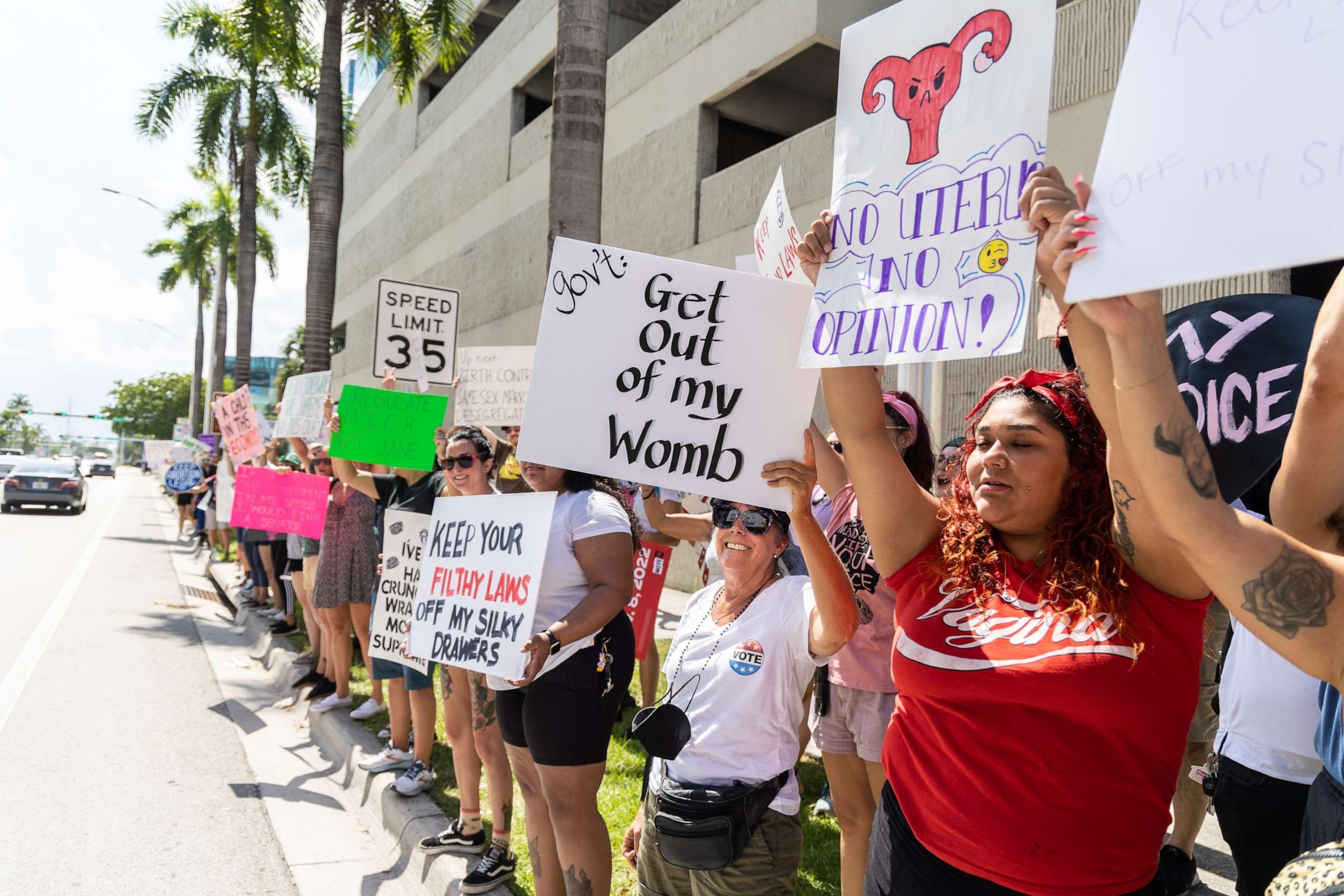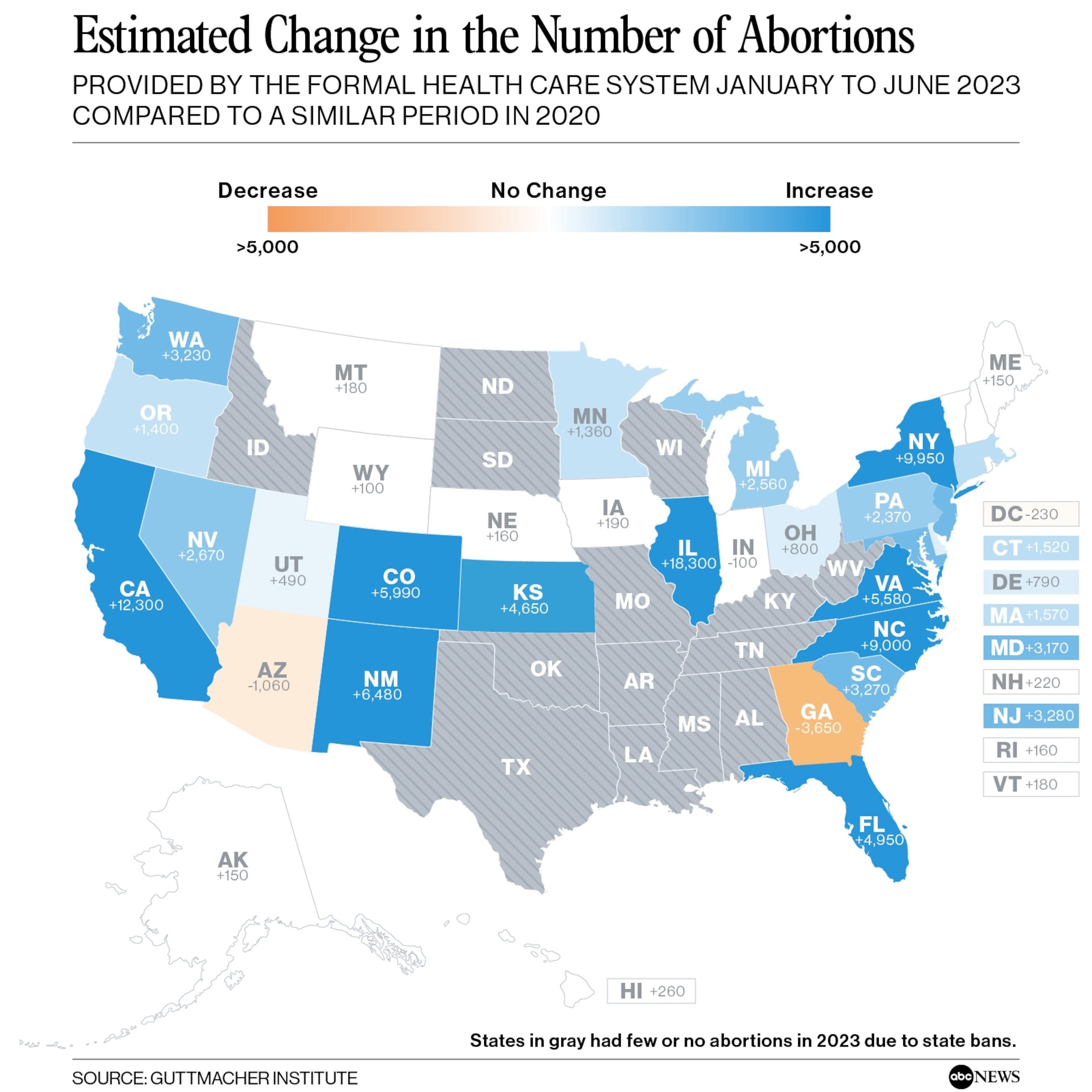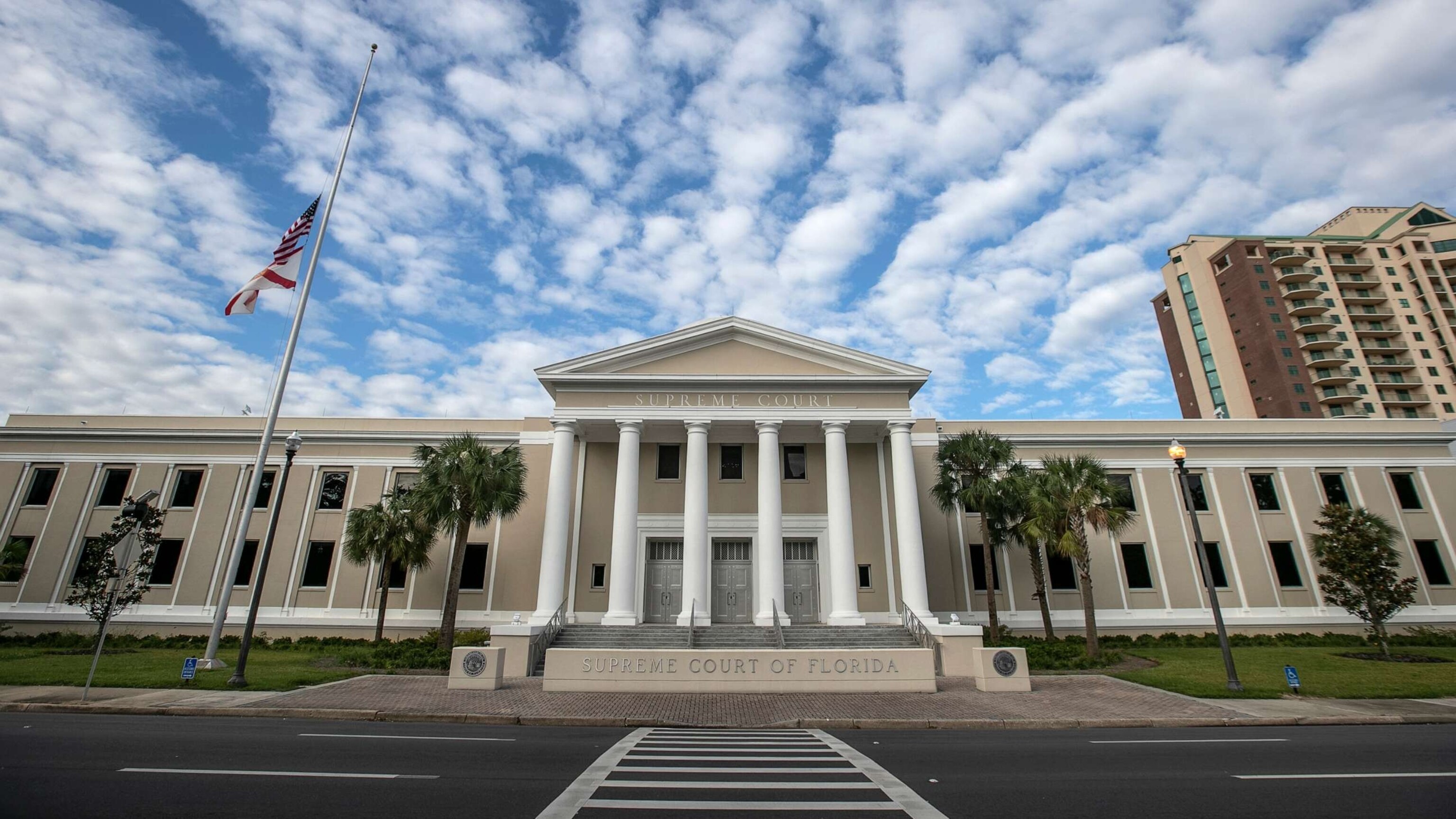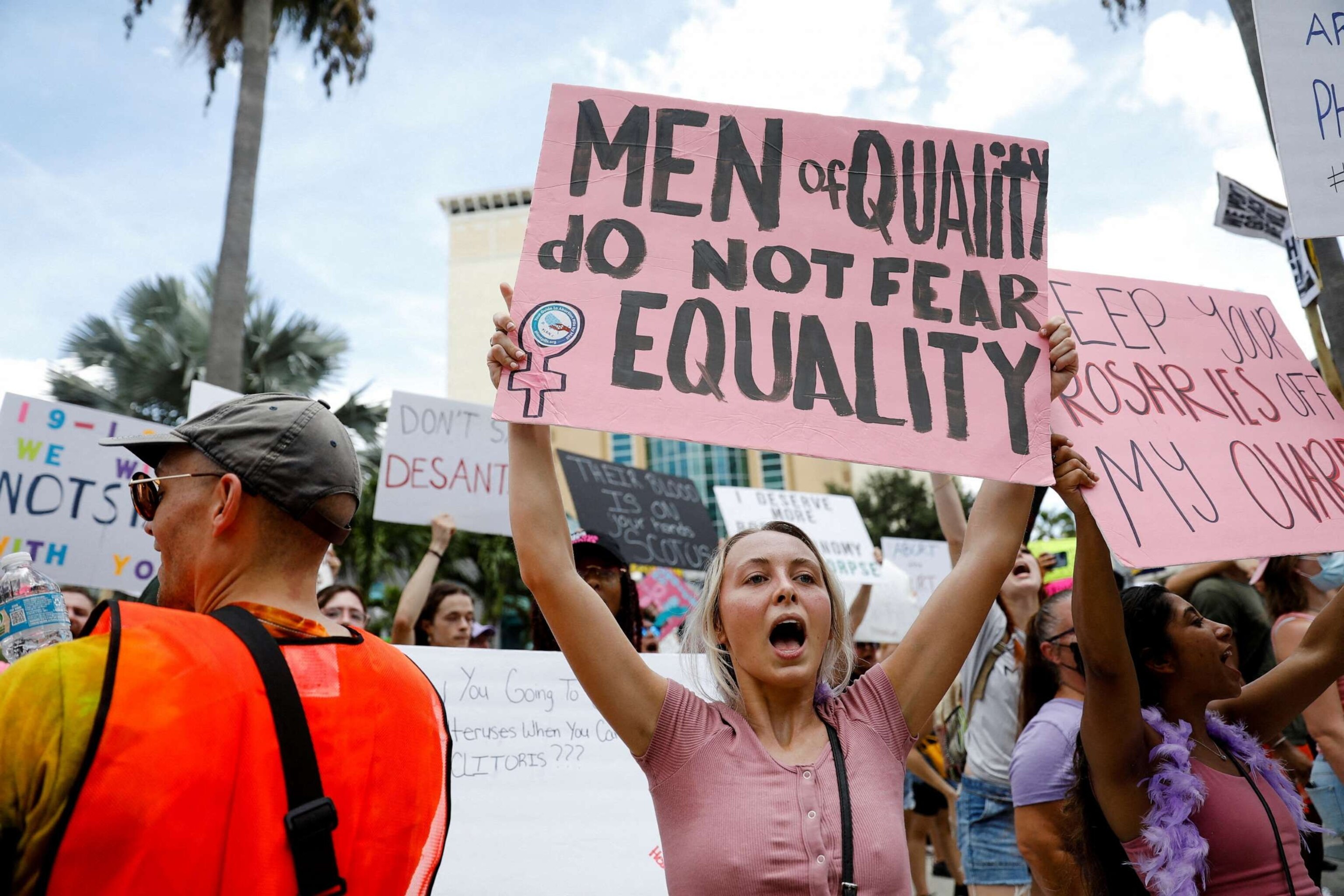Florida Supreme Court hears arguments in challenge to 15-week abortion ban
If the ban is upheld by the court, a six-week trigger ban will go into effect.
The Florida state Supreme Court heard arguments Friday morning in a legal challenge seeking to throw out the state's 15-week abortion ban, claiming it violates the state's constitution.
The ongoing lawsuit was filed by the American Civil Liberties Union on behalf of Planned Parenthood, the Center for Reproductive Rights and other abortion providers against the state of Florida.
In July 2022, a lower state court ruled that the ban violated the state's constitution and it was temporarily suspended. The law went into effect again later that same day when the state appealed the judge's decision. The state Supreme Court took up the case in January upon request from the plaintiffs to weigh in on whether the ban could be temporarily blocked while litigation continues. The Supreme Court has not revealed a timeline for a ruling on whether it will block the ban while litigation continues in a lower court, or whether it will side with the state of Florida and allow the 15-week ban to continue.

The plaintiff's lawyer, Whitney White, was the first to speak before the Supreme Court. Justices interrupted her opening statement several times with questions about the suit and whether the state constitution's privacy protections include protections for abortion rights.
Justices asked White why the privacy clause -- passed in the 1980s via voter referendum -- did not arouse debate between anti-abortion groups and pro-abortion groups at the time, suggesting the right to abortion was not implied in the privacy clause.
"This is a 50-year reflection by our society, by our state, that people's elected representatives believe that there's a compelling interest in protecting human life. Why should we as a court not defer to that?" Chief Justice Carlos Muniz asked White.
White argued that Florida's privacy clause gave wider privacy protections than the U.S. Constitution.
The lawyer appearing for the state, Henry Whitaker, started his opening statement by arguing that the Florida Constitution does not provide protections for abortion rights, before being interrupted with questions from justices.
Muniz asked Whitaker how the state believes justices should determine what voters who approved the privacy amendment to the constitution would consider to be an intrusion into their private life.
Whitaker also argued that Floridians had not internalized Roe v. Wade in the 1980s.
"Roe v. Wade may have been an abomination. It may have been semantically absurd to talk about that in terms of privacy, but for better or worse, that was part of our cultural kind of lexicon," Muniz said.

Justice Jamie Grosshans asked Whitaker how the state will address the fallout of the court overturning 30 years of precedent if it upholds the ban.
"If we as a court adopt your legal approach to this amendment, it affects dozens of other cases outside the abortion context, dozens of other subjects that relate more to a decisional autonomy," Grosshans said.
Whittaker responded, "I think there's a lot less of that concern than meets the eye, your honor."
When White responded to the arguments made by Whittaker -- that the privacy clause only refers to the protection of information from government snooping -- by saying the court has repeatedly applied the privacy clause outside of that context, in cases such as parental rights and medical decision making.
"So you're asking us to essentially take a whole class of human beings and put them outside of the protection of the law, essentially, in the sense that if the legislature wants to protect those human beings, they are precluded by the constitution of Florida from doing that," Muniz asked White. "And at the end of the day, the argument as to why that would be right would be based on a sort of legal meaning -- kind of understanding -- of right of privacy."
"The court repeatedly emphasized that nothing in the Dobb's decision displaces pre-existing state constitutional protections for abortion that were more protective than the federal law," White said.
In a statement released after the hearing concluded, White said the ban has been in effect for over a year, defying four decades of established protections under the Florida Constitution.
"The state has now asked the court to wipe out any constitutional protection for Floridians' ability to have an abortion at all, clearing the way for Florida to enforce Gov. DeSantis' ban on abortion at six weeks of pregnancy, a time when many people don't even know they are pregnant," White said. "The Florida Supreme Court should respect the rule of law and protect the right of people to make personal medical decisions during pregnancy for themselves."

Plaintiffs discuss potential outcomes after the hearing
In a call with reporters following the hearing, plaintiffs highlighted that a ruling to allow the ban to remain in effect would have consequences for people throughout the southeastern U.S., beyond Florida.
Dr. Robyn Schickler, CEO of Planned Parenthood of Southwest and Central Florida, told reporters that if the court upholds the ban, the challenges for patients "increase exponentially."
"For over a year now I have been forced to turn patients away. ... Even for those I am able to see, the road to my exam room is challenging," Schickler said.
"[Floridians] deserve the freedom to decide what's best for their bodies and their lives," Schickler said.

A Woman's Choice, a clinic that provides abortion care, told reporters that it has been seeing patients from states with bans -- such as Alabama, Mississippi, Texas and Louisiana -- travel to Florida for care, according to Amber Gavin, the vice president of Advocacy and Operations at A Woman's Choice.
If access to abortion in Florida goes down to six weeks, those patients will need to travel to North Carolina, Virginia or even Maryland.
Stephanie Fraim, with Planned Parenthood, said there has been an inundation of parents seeking care in northern Florida, especially, and that clinics have a robust system for helping women travel to Florida to get care.
White told reporters that many people face circumstances and barriers that make it impossible for them to travel to access care in another state.
"It is simply not the case that everyone who needs care will be able to get out of the state," White said. "The harms that will be felt by this abortion ban are serious."
Ballot initiative
Dr. Cecilia Grande, an OB-GYN in Miami, told ABC News that one of her colleagues in Florida had to send a patient with ruptured membranes at 17 weeks home without providing abortion care because of the state's ban. Before the ban was in effect, doctors could provide care without worrying about losing their licenses or facing repercussions from the state, she said.
"Now you have to document, document, document. Have two doctors document," Grande said. "Because we have a 15-week ban, we have not seen horrible things yet like Texas."
"This is a ridiculous ban and it is very dangerous," Grande said.
Grande is part of an initiative to put an abortion question on the ballot and leave it up to voters to decide whether Florida should have guaranteed protections for abortion.
The initiative currently has nearly 298,000 signatures, according to the Florida Division of Elections' website. It would need to get 8% of the total votes cast in the last presidential election in the state, or almost 900,000 signatures, to be added to the ballot.
While Grande said she does not provide abortion care, she has helped patients who develop pregnancy complications that could pose a risk to their lives. She also said she feels comfortable not providing that care because she can refer patients to nearby facilities where they can access abortion care. However, that would be stripped away if the ban is upheld.
The lawsuit before the court
A lower court judge had ruled that the Florida state constitution grants explicit protections for the right to privacy that do not exist in the U.S. Constitution, and that the Florida Supreme Court has established that this grants protections for a woman's right to get an abortion.
Florida's 15-week ban has been in effect since July 2022. The ban grants exceptions for abortions if the pregnancy poses a risk to the mother's life and if the fetus has a fatal anomaly, but not for rape or incest.
After the lawsuit was filed challenging the ban, Florida Gov. Ron DeSantis signed a six-week abortion ban, seeking to further restrict the procedure. If the court upholds the abortion ban, a six-week trigger ban will go into effect in Florida 30 days after a decision, prohibiting abortion care before most women know they are pregnant.
Florida shares a border with several states that have ceased nearly all abortion services.

Data collected by WeCount -- a national research project focusing on abortion and contraception led by the Society of Family Planning -- and the Guttmacher Institute estimates that there was an uptick in the number of abortions provided in Florida since Roe v. Wade was overturned last year. This suggests that access to abortion for women across the South would be further restricted if Florida were to uphold its bans.
"The attempt by Gov. DeSantis and his allies to overturn established law, in defiance of the Florida Constitution, the will of voters, and the rule of law, is deeply misguided and dangerous," plaintiffs said in a joint statement Thursday.
"We hope the Florida Supreme Court will recognize that politicians' thinly veiled attempt to uproot the rule of law would needlessly put people's health and lives at risk and decide to preserve the long-established right to abortion Floridians have relied on for decades," plaintiffs said.




